The 'emergency room of law': Protections are critical for whistleblowers and their lawyers

Illustration by Brenan Sharp/ABA Journal.
The role of whistleblowers and attorneys who represent them has taken on crucial—perhaps existential—importance this year. With the outbreak of the coronavirus and the presidential impeachment trial, whistleblowers have aimed a 20,000-watt interrogation lamp at government agencies and officials at the highest levels. The broadest threats: the preservation of democracy and the physical health of the entire population.
The former had previously been echoed during the 1970s Watergate investigation that led to the resignation of President Richard Nixon; the latter, however, may be unprecedented.
It was widely reported that Dr. Li Wenliang, the Chinese whistleblower who discovered a mysterious virus later identified as COVID-19, was silenced by police after he warned colleagues via social media on Dec. 30. Li later confirmed the reports to the New York Times and other media outlets. He died from the virus in February.
On Feb. 26, an employee of the Department of Health and Human Services lodged a whistleblower complaint with the Office of Special Counsel, an independent federal investigative and prosecutorial agency. It claimed that more than a dozen workers who had been deployed to help the first group of Americans evacuated from Wuhan, China, were not given proper training or protective gear. When they previously raised their concerns with senior HHS officials, the whistleblower complaint claims, the staffers were involuntarily reassigned to other posts and were threatened with termination if they refused to comply.
The complaint has not been released, but one of the whistleblower’s attorneys, Ari Wilkenfeld, a co-founder and partner with Wilkenfeld, Herendeen & Atkinson in Washington, D.C., told the media that a Feb. 27 article in the Washington Post, which broke the news, accurately reflected the whistleblower’s complaints. The following day, the U.S. House Ways and Means committee demanded a briefing from the Trump administration and pushed for an investigation by the Office of the Inspector General.
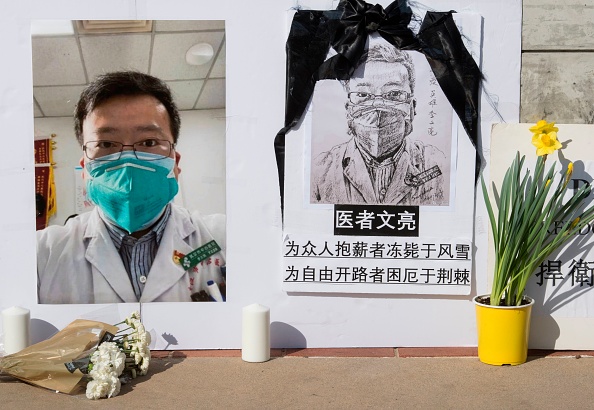
Dr. Li Wenliang. Photo by Mark Ralston/AFP via Getty Images.
President Donald Trump had, no doubt, had his fill of whistleblower allegations of late. The month before the HHS complaint surfaced, he stood trial for impeachment (and was acquitted), on whistleblower charges. An unidentified government employee (the “Ukraine whistleblower”) lit the impeachment tinderbox in September 2019 with allegations that Trump, in an effort to boost his reelection chances, had coerced Ukrainian President Volodymyr Zelensky to announce an investigation of presidential candidate Joe Biden’s son.
The news drove the administration to release a nonverbatim “transcript” of Trump’s July 25, 2019, call with Zelensky, which triggered the congressional investigation. Meanwhile, it threw the whistleblower’s life into a vortex. The nonprofit organization Whistleblower Aid confirmed the whistleblower had received death threats. A Michigan man was indicted in February for making death threats against his legal counsel.
The specter of the whistleblower loomed over the impeachment hearings, much to the annoyance of the president’s legal team.
“This all supposedly started because of a whistleblower,” said White House lawyer Jay Sekulow, clearly piqued, in his opening statement in the Senate trial. “Where is that whistleblower?”
The larger question for the president’s supporters, however, was “Who is the whistleblower?” That was clearly off-limits. Chief Justice of the United States John Roberts, who presided over the Senate trial, refused on Jan. 31 to read a question submitted by Sen. Rand Paul (R-Ky.) that would have identified the purported whistleblower. Paul walked out of the trial and held an impromptu press conference, where he read the question:
“Are you aware that the House Intelligence Committee staffer [name] had a close relationship with [alleged whistleblower’s name] while at the National Security Council together? Are you aware and how would you respond to reports that [they] may have worked together to plot impeaching the president before there were formal House impeachment proceedings?”
Whistleblower protections
Whistleblowers play a crucial role in keeping the government accountable, but they also jump into the lion’s den and say goodbye to life as they have known it—and sometimes, so do their attorneys. The Ukraine whistleblower’s counsel gave numerous interviews at the outset, but they went off the grid and enlisted private security after receiving death threats.
The risks to themselves and their clients weigh heavily on the minds of attorneys who represent whistleblowers.
That has drawn attention to whistleblower-protection statutes, which have been amended over the years, increasing and extending protections to wider groups of whistleblowers. The Whistleblower Protection Enhancement Act of 2012, which amended the Whistleblower Protection Act of 1989, expanded the scope of whistleblower protection and judicial review for federal employees.
All indications show that whistleblower litigation, and legal protections for whistleblowers, will continue to expand. Two bills—the Whistleblower Programs Improvement Act and the Whistleblower Protection Reform Act of 2019—which were introduced in both the House and the Senate last year, were pending in Congress as of the publication date of this article. The former would enhance incentives and protection under the Commodity Exchange Act and the Securities Exchange Act of 1934; the latter would expand the definition of a whistleblower with regard to securities law violations.
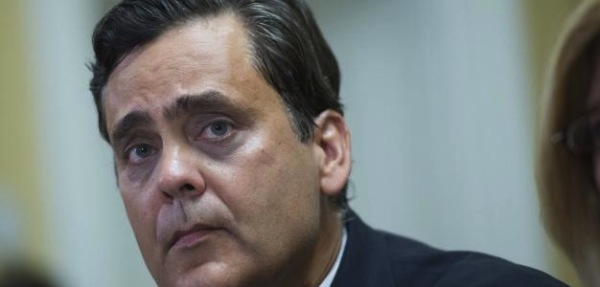
Jonathan Turley.
Expanding protections is important, says professor Jonathan Turley of George Washington University Law School, who testified as an expert witness at the Trump and Clinton impeachment hearings. The Ukraine controversy put a much-needed spotlight on current whistleblower protections, he says.
“The main concern among whistleblowers is that the process moves at a glacial pace and affords them limited ability to participate and review evidence,” he says, adding that many federal employees are mistrustful of the whistleblower-protection system.
Turley finds that concerning, noting that intelligence whistleblowers Edward Snowden and Bradley (now Chelsea) Manning made their disclosures outside the system because they didn’t feel they could do so within the system.
“That has to be addressed,” says Turley, who has represented whistleblowers. He believes they should have more procedural rights, including greater access to information and the ability to present their cases fully. Federal agencies, he says, are given “overwhelming deference in creating the record.”
Manning, a former U.S. Army soldier who in 2010 disclosed classified information about the Iraq and Afghanistan wars to Wikileaks, served seven years of a 35-year sentence that was commuted by President Barack Obama in 2017. Manning was subsequently reincarcerated for refusing to testify about a WikiLeaks investigation in 2019 but was released in March because the grand jury hearing had concluded.
The Trump hearings showed that even officials at the highest levels of government have serious misconceptions about what legal protections whistleblowers do—and do not—have, Turley adds. While he believes it is important to protect the anonymity of a whistleblower in certain types of cases, he underscores that the law expressly protects a whistleblower from retaliation, not anonymity.
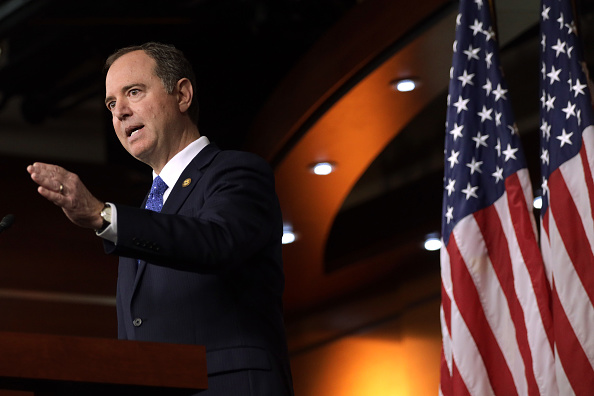
Rep. Adam Schiff. Photo by Alex Wong/Getty Images.
Rep. Adam Schiff, D-Calif., lead impeachment manager at the Trump impeachment trial, takes the opposite position. Since the beginning of the impeachment proceedings in late 2019, he argued repeatedly that the whistleblower has a statutory right to anonymity.
“When you have members [of Congress] like Chairman Schiff who are misstating the federal law, there is clearly a problem with the understanding of what protections are afforded under the law,” Turley says. “Chairman Schiff seemed to believe there was a protection for anonymity that doesn’t exist. It reflects the fact that whistleblower protections have not been given the type of attention that they deserve.”
There isn’t a large body of legal precedent interpreting whistleblower protection statutes, which exacerbates the confusion. The difference of opinion between Turley and Schiff, who in certain respects are both correct, stems from the fact that federal law prevents only inspectors general and their staffs from revealing the name of a whistleblower. It doesn’t explicitly preclude members of Congress or the president from outing a whistleblower, but it doesn’t authorize it, either. To further complicate matters, the Intelligence Identities Protection Act forbids any official from disclosing the name of a whistleblower who is a covert agent, but that does not appear to be the case with the Ukraine whistleblower.
The Intelligence Community Whistleblower Protection Act of 1998 protects intelligence and national security whistleblowers, but only if they make a disclosure through proper internal reporting procedures. The complaint must be filed with the inspector general of the federal agency the whistleblower works for or with the Inspector General of the Intelligence Community. If the IG deems the complaint credible and of “urgent concern,” he refers it to relevant agency head or the director of national intelligence, and it goes up the chain to congressional intelligence committees.
The Ukraine whistleblower is protected because he followed that procedure; Snowden had zero protection because he did not. The Ukraine whistleblower is rumored to be a CIA official, which, if true, accords him additional protections under a 2014 amendment that covers CIA employees.

Edward Snowden. Photo by the Guardian via Getty Images.
One attorney and his whistleblower client
ACLU attorney Ben Wizner began representing Snowden after he made disclosures about the government’s widespread clandestine practice of gathering personal information on Americans.
Had Snowden consulted him before making the disclosures, says Wizner, “I would have tried to stop him. I wouldn’t want to see someone blow his life up”—which is exactly what Snowden did.
Wizner was sitting at his desk on a Monday morning in 2013, planning his week, when a video popped up on his computer screen. An unassuming 29-year-old announced to the world that he was the anonymous whistleblower who had disclosed the National Security Agency’s practice of covertly collecting surveillance data on every individual in the United States. Wizner’s jaw dropped.
The unidentified man with whom he had been exchanging encrypted emails for months was Snowden, who had become, and still is, one of the most wanted fugitives in the world.
With the NSA on a search-and-destroy mission to identify and arrest him, why did Snowden out himself?
Snowden did not seek legal counsel beforehand because he didn’t want to implicate others in what he knew would be considered serious criminal conduct, says Wizner. Snowden is well versed in the law (one of the first things he asked Wizner was, “Will you have standing?”), and knew that an attorney cannot represent someone who intends to commit a crime. “I wanted the responsibility to rest with me,” he told Wizner, who still represents him.
For Snowden, a former CIA employee who was an NSA contractor at the time, it was strictly a matter of principle and civic duty. He had nothing to gain—other than a clear conscience—and everything to lose. If Snowden were to return to the United States he would be tried for three felonies: theft and two that fall under the 1917 Espionage Act—“unauthorized communication of national defense information” and “willful communication of classified communications intelligence information to an unauthorized person”—each of which carries a sentence of up to 10 years.
History of whistleblower protection
The term “whistleblower” was coined in the 19th century by Joseph Hudson, a British toolmaker who invented whistles used by police (including Scotland Yard) and sports referees. “Blowing the whistle” (later called “whistleblowing”) became slang for a situation that needed urgent attention. It became widespread in the United States in the 1970s, when consumer advocate Ralph Nader spun it into headlines about dangerous products, which in turn boosted product liability litigation.
Not often invoked until the past few decades, whistleblower protection laws date back to the American Revolution. The Continental Congress unanimously passed the first statute in 1778 after U.S. Navy officers disclosed the torture of British prisoners of war. The officer who had ordered the torture sued two of the whistleblowers for libel. The government passed a protection act because it did not want to deter others from coming forward, which is the same rationale underlying modern statutes.
Whistleblowing began to grow teeth in the 1970s, when disclosures made headlines, and some became popular movies. Daniel Ellsberg’s 1971 release of the “Pentagon Papers” (a top-secret government expose about the Vietnam War) set precedent in the Supreme Court; Frank Serpico testified before the Knapp Commission, exposing corruption in the New York Police Department, in 1971; and Karen Silkwood revealed high levels of radiation exposure to workers in nuclear power plants in 1974.
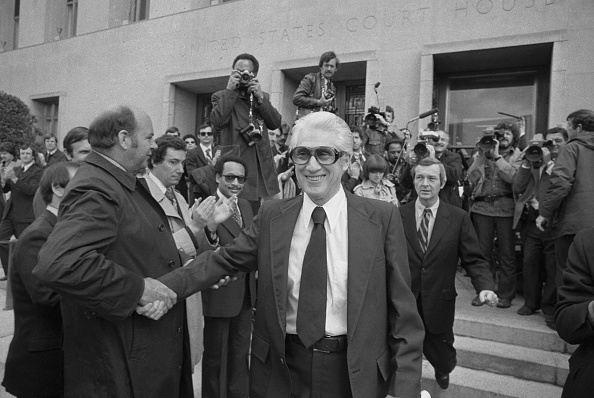
Mark Felt. Bettmann/Contributor/Getty Images.
The king of whistleblower cases, of course, was the classified information that “Deep Throat” (later identified as Mark Felt, associate director of the FBI) provided to the Washington Post in 1972, which led to the resignation of President Richard Nixon.
“If you look at whistleblowers like Deep Throat, these people changed history. Watergate might not have happened but for him,” says Turley.
The more common cases
Attorneys do not fall into whistleblower law by happenstance. Many were federal prosecutors or legal counsel in the intelligence community; others come from the plaintiffs’ bar. There is no official tally of how large the whistleblower bar is, but it is an extremely specialized practice dominated by a handful of powerful litigators, most of them in small-to-medium-size firms.
Few of them have clients whose disclosures make international headlines or result in felony charges. A large segment of whistleblower cases—which are different from intelligence whistleblowing because they provide financial incentives—are civil matters.
“The garden variety species of a [False Claims Act] case is just [about] lying, cheating and stealing,” says Daniel Oliverio, a partner of Hodgson Russ in Buffalo, New York, who leads the firm’s false claims and whistleblower representation practice. “Someone’s trying to chisel money out of the government illegally,” he says. “No one likes to hear that your government is paying money it shouldn’t pay. All of us are taxpayers.”
See also: Sounding the alarm: One whistleblower’s story
There are numerous provisions in the law that protect whistleblowers, mainly from retaliation in their employment. One of the largest segments of whistleblower cases comes under the federal False Claims Act. These cases are civil matters involving disclosures by a person who reports serious fraud in procurement (government contracts). FCA claims took off in 1986, when the law was amended to provide monetary rewards for whistleblowers.
The original FCA was enacted during the Civil War because Congress feared that defense contractors were cheating the government out of money by submitting inflated or exorbitant billings. More recently, the Department of Justice reaped more than $3 billion in settlements and judgments from civil cases involving fraud and false claims against the government in the fiscal year ending Sept. 30, 2019.
Other whistleblower statutes cover stock manipulation, money laundering, tax evasion, false billing for health care, corporate misconduct, foreign corrupt practices and other misdeeds. There are even specialized statutes that provide recovery for whistleblowers in aviation and wildlife crime.

Bradley Birkenfeld. Photo by Thomas Samson/AFP via Getty Images.
The case that put reward whistleblowing on the map was a 2012 award of $104 million from the IRS, the highest amount ever paid to an individual whistleblower. Bradley Birkenfeld, an American working for Swiss banking giant UBS, reported an illegal banking scheme to hide money in Switzerland for American taxpayers. It led to $780 million in fines and taxes being levied against the IRS and answered an untested legal question: Can a participant in a fraud who reports it be eligible for a government award?
Birkenfeld was a participant but received an award nonetheless. His actions were part of his duties as an employee, and when he realized the conduct was illegal, he reported it. But he also paid a steep price: two-and-a-half years in federal prison.
Other civil whistleblower cases have presented the classic win-win situation. Commonly referred to as “bounty” or “rewards” statutes, these laws allow a whistleblower to share in a financial recovery by the government that results from information he uncovers and reveals. His attorney benefits as well, but that varies with whether his client is the whistleblower (plaintiff) or the defendant (who, in FCA cases, is typically a corporation). Whistleblower defense cases are billed at an hourly rate, while plaintiffs’ cases are normally handled on a contingency fee basis.
Without a roadmap
A niche practice area, whistleblower law has many traps for the unwary. The procedural rules, subject matter, statutes and exposure vary widely, and in many cases, there is little case law to follow.
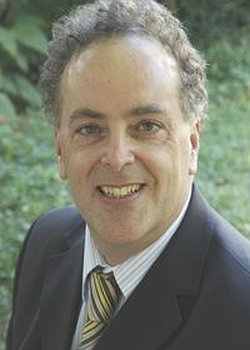
Stephen Kohn.
High-profile whistleblower attorney Stephen Kohn, a partner with Kohn, Kohn & Colapinto, in Washington, D.C., who has been practicing whistleblower law exclusively since 1984, says there is no “cookie-cutter” whistleblower case. He describes whistleblower practice as an “emergency room of law” and says that even a tiny mistake can have a catastrophic impact. “The whistleblower often comes to us in pretty bad shape. He’s at risk to be killed [in his profession]. It’s our job to get those bandages on, get him back to health and have him walk out in good condition.”
Kohn found that particularly crucial when he represented Linda Tripp, who became his client after disclosing information about Monica Lewinsky that contributed to the impeachment of President Bill Clinton. Kohn represented Tripp in a subsequent civil suit under the Privacy Act against the government for retaliation (a common issue for whistleblowers) after it, in turn, disclosed damaging material about her from her government personnel file. The case settled for $595,000.
Some whistleblower attorneys know what it’s like to sit on the client’s side of the table. Among them is whistleblower John Tye, founding partner and CEO of Whistleblower Aid, which is providing support and security to Ukraine whistleblower attorneys Mark Zaid (also a founding partner of Whistleblower Aid) and Andrew Bakaj. The organization’s motto, “Report government and corporate lawbreaking. Without breaking the law,” reflects the path Tye took in 2014 when he was an official with the U.S. Department of State.
Tye was part of the diplomatic team in charge of bilateral negotiations with Brazil, Germany and several other countries regarding asylum for Snowden. Tye made intelligence disclosures similar to Snowden’s, but he did so legally and hired Zaid to represent him.
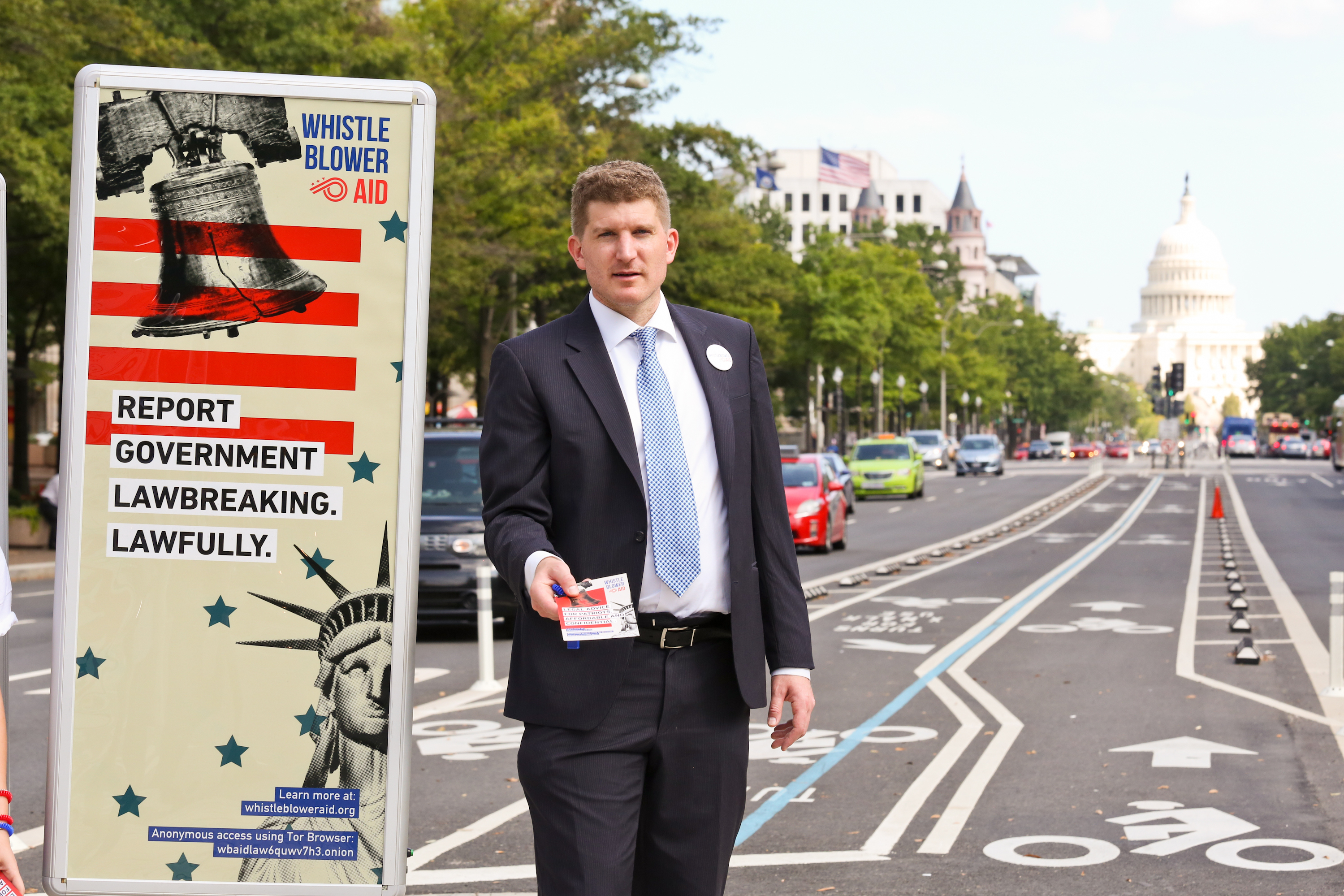
John Tye.
Whistleblower Aid also successfully represented Bakaj in his retaliation case against the CIA, where he worked as an attorney. The retaliator, says Tye, was Christopher Sharpley, whose nomination to be inspector general of the CIA was pending before the Senate. As a result of disclosures by Bajak and others, Sharpley withdrew his nomination in July 2018 and resigned from the government after 36 years in federal law enforcement.
Such high-profile whistleblower cases, particularly those that suddenly land on an attorney’s desk, can be daunting, both for the attorney and the client.
“I don’t know if there’s a way anyone can prepare for an experience like this. My preparation basically involved losing a lot of cases,” says Wizner, referring to the nine years he struggled to get government surveillance cases adjudicated on the merits. Time after time, the cases were dismissed for lack of standing. The Snowden matter provided the breakthrough because the ACLU’s telephone records were part of the evidence seized by the government.
Wizner says the Snowden representation shaped him as an attorney in profound ways. Most of all, he says, it “underscored how much” a lawyer has to put the client at the center of the representation. “I’ve had many thoughts over the years about wanting to help him resolve his situation [of having to live in exile], but what he wants is to advocate for democratic reform,” he says.



